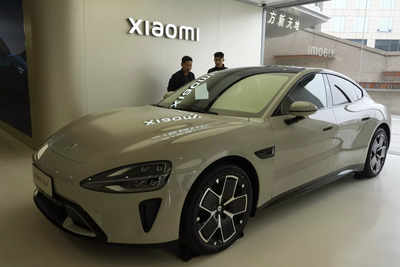- News
- Technology News
- Tech News
- Fatal Crash: Xiaomi's ambition to take on Tesla gets a major setback
Trending
Fatal Crash: Xiaomi's ambition to take on Tesla gets a major setback
Xiaomi has reportedly postponed the launch of its YU7 electric SUV following a fatal accident involving its SU7 sedan, which is currently under investigation. This delay impacts Xiaomi's ambitious EV strategy to compete with Tesla and BYD. The company faces increased scrutiny over autonomous driving technology and vehicle safety, affecting investor confidence.
China's Xiaomi Corp has reportedly postponed the launch of its first electric SUV, the YU7, following a deadly accident involving its flagship SU7 electric sedan. According to a report in Bloomberg, quoting sources familiar with the matter, "Xiaomi Corp. pushed back the debut of its first sport utility vehicle following a fatal accident involving its marquee electric car". The delay in launch of Xiaomi YU7 is a setback for the Chinese tech giant’s $10 billion push to challenge Tesla Inc. and BYD Co. in the world’s largest auto market.
Originally slated for a June or July debut, the YU7’s release is now reportedly on hold with no new timeline confirmed, according to insiders who requested anonymity due to the sensitivity of the matter. Xiaomi also canceled plans to unveil the SUV at this week’s Shanghai auto show and rescheduled its annual investor day from late April to June, one source said.
The decision comes as Xiaomi grapples with the fallout from a March 29 crash in Anhui province, where three women died after an SU7 sedan, operating on autopilot, collided with concrete barriers on an expressway and burst into flames. The incident, now under police investigation, has fueled public scrutiny of Xiaomi’s assisted-driving technology, battery safety, and overall vehicle design.
Poll
Should Xiaomi continue its push into the EV market despite recent setbacks?
The tragedy has also drawn regulatory attention. China’s industry watchdog recently summoned over a dozen automakers to discuss stricter guidelines for autonomous-driving systems, signaling tighter oversight ahead.
Despite strong early demand for the SU7, which prompted Xiaomi to raise its 2025 delivery target to 350,000 vehicles last month, investor confidence has wavered. Xiaomi’s shares have slid over 20% in Hong Kong since mid-March, reflecting growing unease about its EV prospects.
Xiaomi declined to comment on the YU7 delay or the crash investigation. The setback underscores the challenges Xiaomi faces as a newcomer in the cutthroat EV industry, where safety and reliability are under intense scrutiny. For now, the company’s drive to rival global auto giants remains on hold as it navigates the road ahead.

About the Author
TOI Tech DeskEnd of Article
Latest Mobiles
Follow Us On Social Media









